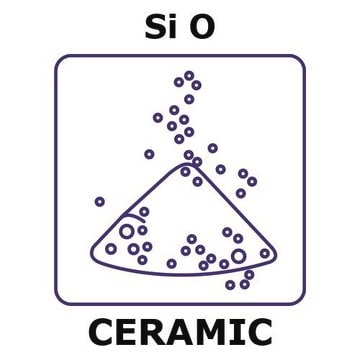336823
Silicon monoxide
pieces, 3-10 mm, 99.99% trace metals basis
Synonym(s):
Oxosilylene, Silicon oxide (SiO)
About This Item
Recommended Products
Assay
99.99% trace metals basis
form
pieces
particle size
3-10 mm
density
2.13 g/mL at 25 °C (lit.)
application(s)
battery manufacturing
SMILES string
[O+]#[Si-]
InChI
1S/OSi/c1-2
InChI key
LIVNPJMFVYWSIS-UHFFFAOYSA-N
Looking for similar products? Visit Product Comparison Guide
Signal Word
Warning
Hazard Statements
Precautionary Statements
Hazard Classifications
Eye Irrit. 2 - Skin Irrit. 2 - STOT SE 3
Target Organs
Respiratory system
Storage Class Code
13 - Non Combustible Solids
WGK
WGK 3
Flash Point(F)
Not applicable
Flash Point(C)
Not applicable
Personal Protective Equipment
Choose from one of the most recent versions:
Already Own This Product?
Find documentation for the products that you have recently purchased in the Document Library.
Articles
Three approaches generate white light, including LED-based down-conversion for broader applications.
Three approaches generate white light, including LED-based down-conversion for broader applications.
Three approaches generate white light, including LED-based down-conversion for broader applications.
Three approaches generate white light, including LED-based down-conversion for broader applications.
Our team of scientists has experience in all areas of research including Life Science, Material Science, Chemical Synthesis, Chromatography, Analytical and many others.
Contact Technical Service



